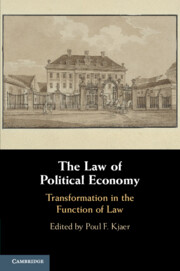Book contents
- The Law of Political Economy
- The Law of Political Economy
- Copyright page
- Dedication
- Contents
- Contributors
- Acknowledgements
- Abbreviations
- 1 The Law of Political Economy
- Part I Studying the Law of Political Economy
- Part II Transformations of the Law of the Globalising Economy
- 5 Law in Global Political Economy
- 6 Law of Natural Resource Extraction and Money as Key to Understanding Global Political Economy and Potential for Its Transformation
- 7 ‘Social Nature’
- Part III The Transformation of the Law of Political Economy in Europe
- Part IV Towards a New Law of Political Economy
- Index
7 - ‘Social Nature’
Political Economy, Science, and Law in the Anthropocene
from Part II - Transformations of the Law of the Globalising Economy
Published online by Cambridge University Press: 18 April 2020
- The Law of Political Economy
- The Law of Political Economy
- Copyright page
- Dedication
- Contents
- Contributors
- Acknowledgements
- Abbreviations
- 1 The Law of Political Economy
- Part I Studying the Law of Political Economy
- Part II Transformations of the Law of the Globalising Economy
- 5 Law in Global Political Economy
- 6 Law of Natural Resource Extraction and Money as Key to Understanding Global Political Economy and Potential for Its Transformation
- 7 ‘Social Nature’
- Part III The Transformation of the Law of Political Economy in Europe
- Part IV Towards a New Law of Political Economy
- Index
Summary
Data-driven approaches to environmental governance, such as those promoted by the planetary boundaries concept, permit the rapid circulation of actionable information on environmental performance through transnational networks operating within the political economy. Some of the most promising approaches emerge from structural cuopling between science and economics, largely bypassing law and politics, and operating in cognitive, rather than normative, terms. Yet a purely cognitive global ecological law, offering no possibility of stabilisation of expectations, would ultimately be ineffective. I argue that a role for law emerges if the normative dimensions of the condensation of complex scientific insights into metrics with a high degree of resonance in the political economy are taken seriously. Law must do more than transduce scientific data into metrics, as though scientists have unmediated knowledge of Earth systems. Rather, the normative dimensions of scientific knowledge-production, notably in processes of judging, arguing, and persuading, create opportunities for the development of norms governing the processes of condensing and translating scientific knowledge of ecological risk into signal of economic risk. As Bruno Latour argues, responses to ecological crisis ought not to be conceived of as a new form of jus naturalis, containing norms and standards dictated directly to humankind by the non-human world; instead, what is required is a jus gentium that accepts the unknowability of the non-human world, and the mediated – and therefore highly normative – channels through which knowledge of that world is derived.
Keywords
- Type
- Chapter
- Information
- The Law of Political EconomyTransformation in the Function of Law, pp. 181 - 202Publisher: Cambridge University PressPrint publication year: 2020
- 1
- Cited by



